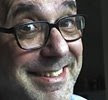What did Steve talk about? A very short bit on how Apple is doing. The obligatory dig at the guy from Redmond. A short bit on Apple TV. A long bit on iPhone. And, by the way, we're changing the name of the company to Apple, Inc.
And then it's, "Thank you and good night ladies and gentlemen you've been a wonderful audience be sure to tip your server and enjoy the rest of the show." Cue orchestra for bows.
He didn't even talk about all the products that Apple introduced yesterday. He didn't give us an OS update. He didn't tell us how many new stores he opened last year. How many he plans to open this year.
There's a lesson in there for anyone who needs to communicate. Focus.
Decide what you need the audience to walk away with. Leave everything else out.
Here's a discipline I learned when I studied how to write sermons (homiletics) with Rabbi Martin A. Cohen.
Next time you have to craft a presentation or a speech (or a blog post) do this: put in the time to write a one-sentence thesis. Can you boil it down to one sentence? Not a list of bullets. Not an outline. But one sentence. If you could ask the audience to remember one thing, what would that be.
It has to be a simple declarative sentence. One subject. One verb. No independent clauses. No semi-colons. No conjunctions. Get the thesis of your speech down to one sentence and then build up from there. It doesn't have to be a sappy bit of memorable copy. In fact, your audience will probably never hear or see the key-sentence. It's only for your guidance.
Here's mine for this post:
Memorable communications require a clear core idea.Allow yourself a greeting and introduction. Allow yourself a conclusion and charge to the audience. Aside from that the body of the speech has to illuminate and demonstrate the one core idea in your thesis sentence.
Don't underestimate the difficulty of pulling it all into one sentence. You can't overestimate the value.
(Of course, it helps if you actually have something to talk about, as Steve clearly did. The exercise of writing a thesis statement will help you discover whether or not you do.)
Mickeleh's Take: If you don't determine what the audience should remember about your message, they may not remember anything.
(Tags: Communication, Speechwriting, Steve Jobs, iPhone, Keybnote)

1 comments:
brilliant!
Post a Comment